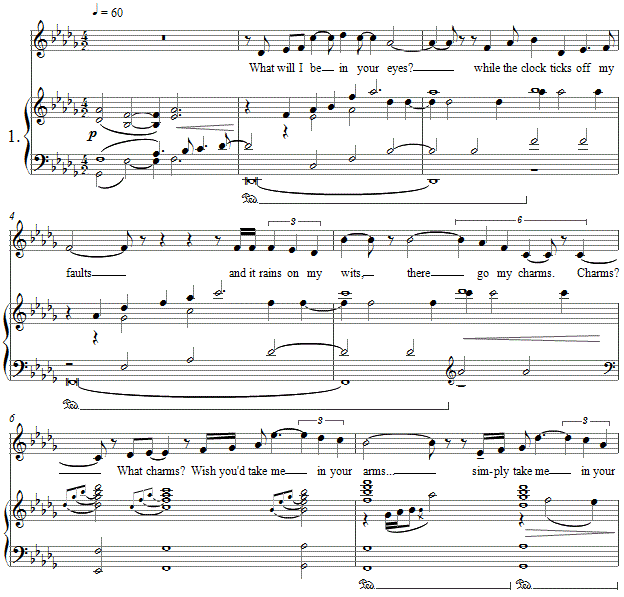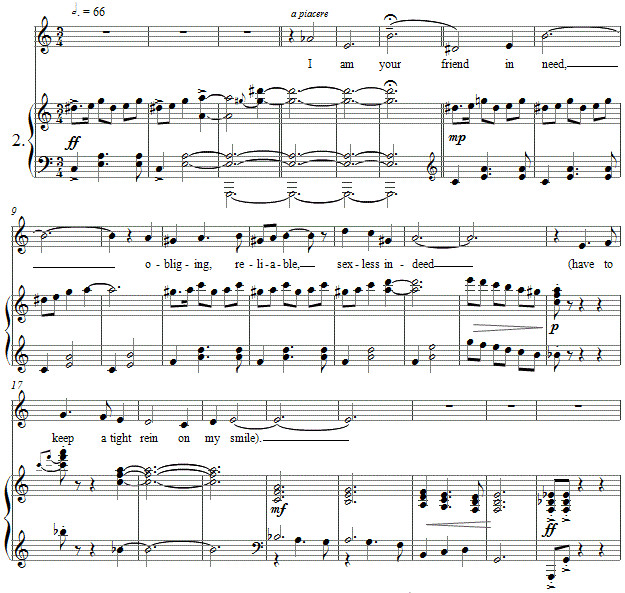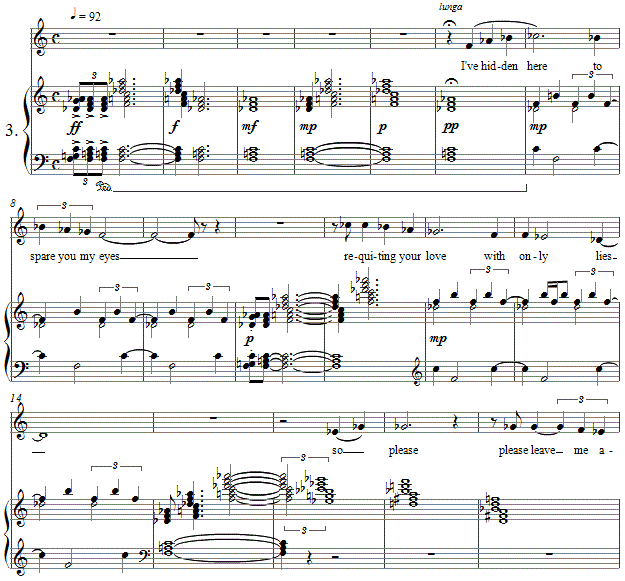Music and Texts of GARY BACHLUND
Vocal Music | Piano | Organ | Chamber Music | Orchestral | Articles and Commentary | Poems and Stories | Miscellany | FAQs
Three Songs of a Woman - (2011)
Eva Bauche-Eppers
for mezzo soprano and piano
i. What Will I Be
What will I be in your eyes? - -
While the clock ticks off my faults
and it rains on my wits,
there go my charms.
Charms? What charms?!
Wish you'd simply take me in your arms...
(Hiding, Rodomonte?)
A failure,
a nuisance,
a bore,
a somewhat peculiar prize -
wonder what I will be in your eyes.
ii. In Need
I am your friend in need,
obliging, reliable, sexless indeed
(have to keep a tight rein on my smile).
Just let our eyes never meet,
because there you might read
I'm so viciously hungry for you,
so greedily, hilariously in love...
iii. Spiral
I've hidden here
to spare you my eyes
requiting your love
with only lies
so please leave me alone
in my ivory tower of sound
walking the stairs
up and down
around and around
never airborne
never touching the ground
not really in heaven
not quite mundane
not thoroughly mad
yet not wholly sane
haunting the stairwell
a self-contained flame -
stay away
don't touch me
it hurts
Copyright © 2011 Eva Bauche-Eppers All international rights reserved
Texts used by permission
[ 7 pages, circa 6' 35" ]
Eva Bauche-Eppers
Eva Bauche-Eppers is an award-winning translator of English fiction into German, having been awarded the Kurd Laßwitz Prize in 2003. She has worked with authors, China Miéville, Robin Hobb, Megan Lindholm, Margaret Weis, Tracy Hickman, Michael Marano, and Daniel Easterman, and written poetry. Bauche-Eppers left a career in telecommunications when her daughter was born, and thereafter some stories which she had written as a member of Germany's first fantasy club, FOLLOW, were accepted by a publisher, collected as Wanderer unter dunklem Himmel. The same publisher has a science fiction series for which she also wrote, and then translated into German more science fiction and fantasy from English language authors. A singer as well, she has studied with Ursula Bauer.
The opening question of slow-fast-slow arch of texts and song rises the octave with an insistence on the question itself. The tempo is marked as the quarter note at 60 in awareness of the clock which "ticks off my faults." The wide range of the following phrases mirror that psychological truth of confidence coupled inexorably to doubt. The repetition of the "wish" as in measure six and thereafter builds the sense of insistence and longing to find answers to the questions. The literary reference to Rodomante is from the Middle French and 17th century Italian words, which became the name of Boiardo's fictional character, a blusterer who ultimately loses his life.
The litany of characteristics is almost a sales pitch to the "other" which hides the manic pressure to create this relationship hinted at in the first text, as one carries this story across the three for its dramaturgical effect. An aggressive, up tempo waltz blurts out this text and is over within a minute, perhaps one of the minutes mentioned "as the clock ticks off my faults."
The bitonality of the final setting captures the sense of loss and pain. The Klang changes little until a rhapsodic section tells of the "up and down / around and around" of this spiral of emotion, as the harmonic scheme of the setting simply slips by scale degrees. A final coda for the solo piano ends this sketch of a woman's hopes dashed into pieces, the last gestures rising in the piano's range to its topmost brittle colors.
The score for Three Songs of a Woman is available as a free PDF download, though any major commercial performance or recording of the work is prohibited without prior arrangement with the composer. Click on the graphic below for this piano-vocal score.



